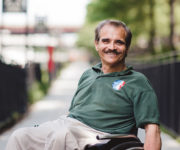Meet the Match
A South African Trailblazer for Adaptive Sports
Patrick Selepe learned from an early age that nothing in life comes easy.
Born in Limpopo province in South Africa, Patrick was only 3 years old when his father died. His mother soon remarried, and his new stepfather never fully accepted him as his own. It wasn’t long before Patrick realized he would have to take care of himself.
The challenges mounted with time. When he was 19 years old, Patrick was diagnosed with bone cancer and had his leg amputated. He still remembers the date of the surgery: September 26, 1996. It was another in a long road of bumps.
“After getting out of the hospital, it was a new journey for me,” Patrick says. “I didn’t have anyone to guide me, but I decided not to lock myself away in the house. With the support of my family and schoolmates, I pushed ahead.”
As he sat clicking through television channels one day, Patrick stumbled upon coverage of Fanie Lombaard, a South African Paralympic gold medalist and record holder in the discus, shotput, and javelin. Watching him compete, he thought if Lombaard could do it, why couldn’t he?
Patrick enquired about Paralympic sports at the provincial sports department and was sent to a club where he began participating in high jump and wheelchair basketball. After breaking the South African record in high jump, he established his own club, Limpopo Sports for Disabled, where he also served as an assistant coach.
With his extensive contacts in the disability community, Patrick was approached in 2003 by leaders interested in developing wheelchair tennis nationally and didn’t hesitate to become a founding member of Wheelchair Tennis South Africa (WTSA).
While serving in various development positions for the organization, Patrick quickly picked up the sport as both a player and umpire. In 2014, he reached a world ranking of No. 60 (singles) and No. 75 (doubles). At the same time, he became an umpire through the International Tennis Federation (ITF), and was the first person with a disability to serve as a line umpire for a Wimbledon Championships qualifier, and the first South African chair umpire with a disability to officiate a Davis Cup match. In 2017, he was awarded the UNIQLO Spirit Award in recognition of his “innovative spirit and desire to see wheelchair tennis continually moving forward to greater heights.” He currently serves as the community development and camps manager for WTSA.
Despite his many different titles during his time with the organization, Patrick has always focused on player recruitment. He regularly travels across South Africa’s nine provinces, uses databases and connections to meet people, and presents at schools and other locations about wheelchair tennis. As he finds players, he also identifies coaches for camps that he runs himself.
Since Patrick first started at the WTSA, there are now more than 500 active wheelchair tennis players in South Africa, 35 centers and schools offering tennis and coaching nationwide, and 70 players ranked by the ITF—second only to Japan. Of the many players he has recruited and developed in the past decade and a half, three have been ranked among the top 15 singles players in the world: Kgothatso Montjane, Lucas Sithole, and Evans Maripa.
“It is very special,” Patrick says. “It is my baby to empower these athletes and coaches. The federation has a small staff, but it gives us strength and we work as a team. We travel to a lot of very rural, inaccessible places. But, our projects never end. We’re helping people turn sport into their careers”
In the communities where Patrick recruits, people with disabilities form a very small segment of the population (statistics from South Africa’s 2011 census indicate 7.5 percent of the country’s population has a disability). While united by sports, disabled people living in these environments face significant challenges. Due to the lack of knowledge on disability and inclusion, many schools are inaccessible or often far removed from poorer communities where disabilities are more prominent. Many families also lack the finances to send their children to school, which affects their future employability and success.
This is where Patrick believes sport can made a difference. He understands that not every South African with a disability will become an athlete. But, he sees how sport opens other career opportunities in coaching, refereeing, and sports administration. He also sees the link between sports and academics, and how this can lead to greater opportunity.
“What we lack in South Africa is non-profit, work-placement academies; places where identified players can come to a center to practice sports, then work on their studies,” Patrick says. “If we can train, educate and nurture athletes with additional services they do not get in school then we will really be making a difference in their lives.”
To turn his vision for impact into a reality, Patrick participated on the U.S. Department of State Global Sports Mentoring Program working with Larry Labiak, who has spent more than a decade as the disability policy officer for Chicago Park District. The CPD is the first park system in the U.S. with major focus on accessibility and disability programming, and Larry plays a key role in ensuring inclusion of people with disabilities with specialty programs that serve those with both physical and intellectual disabilities. As Patrick learned more about creating an NGO structure, fundraising, and staff recruitment, Larry served as a valuable resource of wisdom and experience. Together, both leaders developed an action plan to ensure greater opportunities for inclusion and access to South Africans with disabilities.

